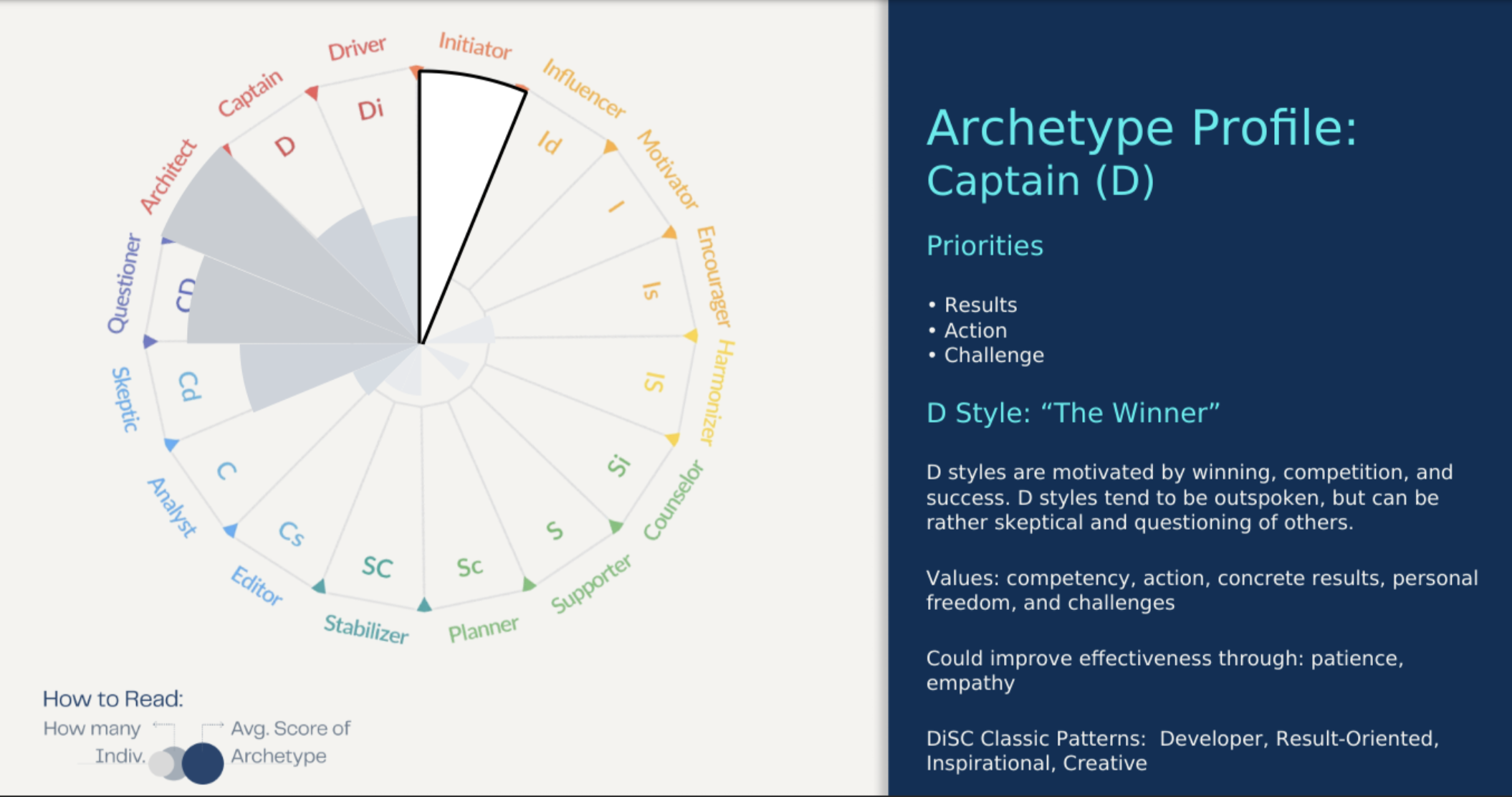The findings, based on DiSC behavioral profiles compiled by Blend in a dedicated dashboard, offer a unique, data-led perspective on how leadership is exercised in data and AI roles across North America. Rather than focusing solely on outputs, it highlights behavioral patterns that influence how leaders make decisions, manage teams, and respond under pressure.
It is a view that complements traditional assessments of success and raises questions about which traits are being prioritized—and which may be overlooked—in the current phase of data and AI leadership.
The Human Code Behind Data Leadership: About the Blend Dashboard
In the race to operationalize AI, it is tempting to fixate on technology, tooling, architecture, and algorithms to demonstrate value and success. However, what actually shapes a data function is not the tech stack, but the people leading it.
Now in its second year, the Blend DiSC dashboard analyzes the behavioral traits of the DataIQ 100 North America – the most influential data and AI leaders in North America – to not only uncover the prevailing leadership characteristics, but to provide guidance and a roadmap for future data leaders as they navigate an ever-changing and malleable industry.
DiSC is a behavioral assessment tool designed to improve teamwork, communication, and productivity in the workplace. DiSC is an acronym that stands for the four main personality profiles described in the model: (D)ominance, (i)nfluence, (S)teadiness and (C)onscientiousness. Widely used in leadership development, DiSC focuses not on capability or intelligence, but on how people behave under pressure, make decisions, and lead teams.

Dominant Traits of the DataIQ 100 North America
The most common personality types in the cohort were Dominance (D) and Influence (I). These are individuals who thrive on results, take charge of complex environments, and are naturally persuasive. These are ideal conditions for navigating AI strategy, cross-functional alignment, and boardroom scrutiny.
Data leaders need a degree of assertiveness to disrupt legacy thinking and push through organizational resistance. Indeed, Chief Data Officers have long been encouraged to bring clarity to their own roles, owning their narrative and creating buy-in even without mandate from the c-suite. It is not just assertiveness but influence, through skills like partnership building and storytelling, which is critical to earning the right to operate.
What is Missing: The Case for Focus on S and C
According to the analysis, data leaders need to consider increasing their focus on the traits found within Steadiness (S) and Conscientiousness (C). The reasons this matters:
- S traits typically bring calm, consistency, and collaboration. These qualities are often undervalued in high-stakes data environments but essential for team cohesion and long-term delivery. This complements another finding from the DataIQ community: humility is one of the key strategic skills for success.
- C traits underpin rigor, precision, and process, which are all critical to robust data governance, model validation, and regulatory compliance.
In short, these are the traits that create trust in data. That is not to say that these traits do not exist within successful data leaders, but they appear to be underrepresented compared to the more dominant traits. With CDOs coming under pressure to deliver quickly, this raises the question of whether data leaders are inadvertently building cultures of velocity without enough checks on direction or durability?
The 2024 findings observed that a CDAOs strength lies in understanding where on the personality spectrum they naturally land, and then adjusting their tact based on; their natural leadership style, who they are speaking with, and what stage of maturity their D&A programs are at. Encouragingly, compared to 2024, data leaders are embracing themselves as the essential catalyst to unlock productivity, top-line growth, and bottom-line efficiencies through data-driven transformation.
Implications for the CDAO Agenda
The analysis offers three pragmatic takeaways:
Personality drives culture, not just output.
When leadership profiles cluster around assertiveness and charisma, that tone tends to permeate teams. If organizations want balance between risk-taking and resilience, speed and stability, they need to actively offset that influence through team design in the early stages.
Hiring and development should consider behavioral complementarity.
Most hiring frameworks focus on skills and experience. But if a senior team is stacked with high-D personalities, perhaps the next key hire should be an implementer, rather than another strategist. Thought and personality diversity in teams is key for success and resilience.
Self-awareness is a leadership multiplier.
The findings of this dashboard should not be used to typecast. Instead, it invites leaders to reflect: Where do I instinctively lead from? Where do I lean too hard? And how do I ensure my function is not an echo chamber of my own strengths?
Achieving Balanced Leadership
AI has become a foundational business capability, and the human demands on data leadership will only intensify. Data success for leaders is no longer reliant just on technical credibility or commercial impact but requires leadership apt at building teams that can scale complexity, absorb uncertainty, and sustain trust.
The 2025 profiles of the DataIQ 100 North America show us the behavioral patterns that have brought leaders to prominence. But for those thinking long-term, the next question is clear: what types of leadership will take the industry further and be the face of the future?
Be a part of the conversation
AI is the catalyst changing the industry and the differentiator for data and AI leaders is how they are scaling AI initiatives effectively. Take part in this anonymous survey and contribute to an industry-benchmarking report that will reflect the reality of scalable AI projects.
Join the DataIQ 100 – and stand alongside the industry’s most influential voices.
If you’re leading change in data and AI, it’s time to make it visible. The DataIQ 100 is the first and only fully curated power list of the most influential data and AI leaders who are shaping strategy, culture, and impact across Europe and North America.
Apply now to be considered for the DataIQ 100 2026 and share your story and impact with the leaders defining what excellence looks like.
Ready to lead the conversation? Register your details here.
Join the premier gathering for data and AI leaders at the DataIQ World Congress, 4–5 November.
This is where the real conversations happen with people who are making the difference. Find yourself among peers who are shaping strategy, influencing investment, and delivering outcomes driven by data and AI. Celebrate the best at the DataIQ Awards and contribute to the collective momentum of data leadership. Get your World Congress tickets now.





